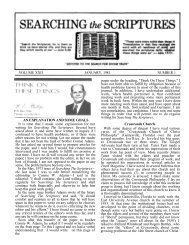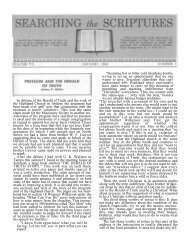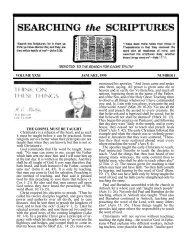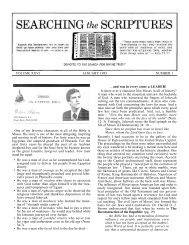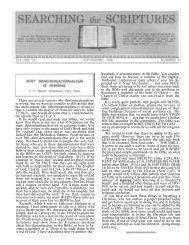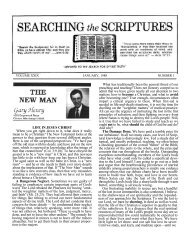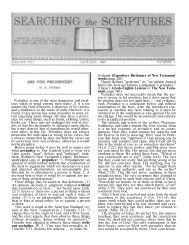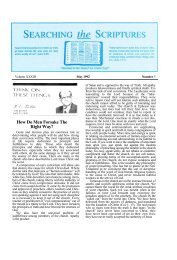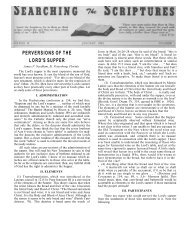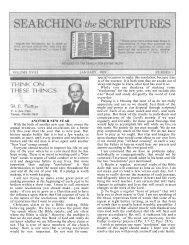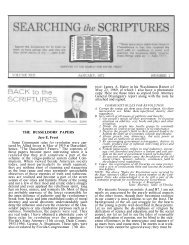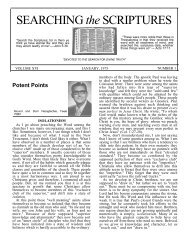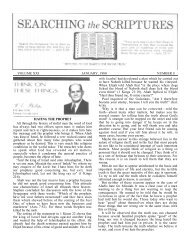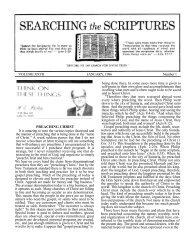In Ephesians 5:22-33, Paul drew an analogy between the ...
In Ephesians 5:22-33, Paul drew an analogy between the ...
In Ephesians 5:22-33, Paul drew an analogy between the ...
Create successful ePaper yourself
Turn your PDF publications into a flip-book with our unique Google optimized e-Paper software.
___________________________________________________________________________________________________Page 21<br />
do not grieve <strong>the</strong> Holy Spirit" seems to be tied here<br />
especially to <strong>the</strong> use of <strong>the</strong> tongue. Immoral speech not<br />
only injures our brethren, but it offends <strong>the</strong> Holy spirit<br />
by whom we are sealed "for <strong>the</strong> day of redemption." It is<br />
<strong>the</strong> Spirit's teaching that directs <strong>the</strong> renewal of <strong>the</strong><br />
mind. To grieve him is to act contrary to his teaching,<br />
<strong>an</strong>d whatever grieves him will cause God to remove from<br />
us <strong>the</strong> seal of redemption (see Eph. 5:6).<br />
The sins named in verse 31 arise in <strong>the</strong> heart but are<br />
closely associated with <strong>the</strong> tongue: bitterness, wrath,<br />
<strong>an</strong>ger, clamor (loud quarreling), <strong>an</strong>d evil speaking.<br />
These things must be put away, toge<strong>the</strong>r with malice,<br />
which is <strong>the</strong>ir root. <strong>In</strong> place of <strong>the</strong>se evil attitudes <strong>an</strong>d<br />
acts, <strong>the</strong> Christi<strong>an</strong>'s heart, words, <strong>an</strong>d life must be filled<br />
with <strong>the</strong> fruits of <strong>the</strong> Spirit. We are to be kind to one<br />
<strong>an</strong>o<strong>the</strong>r, tenderhearted, <strong>an</strong>d forgiving, as forgiving of<br />
o<strong>the</strong>rs as Christ is of us.<br />
That early Christi<strong>an</strong>s, emerging from centuries of<br />
pag<strong>an</strong> darkness, needed warnings against immoral<br />
practices is not surprising. But that we still need some<br />
of <strong>the</strong> same is perhaps <strong>the</strong> saddest commentary one<br />
could write on <strong>the</strong> church today. Too m<strong>an</strong>y members are<br />
jealous of, <strong>an</strong>d <strong>an</strong>tagonistic toward one <strong>an</strong>o<strong>the</strong>r, <strong>an</strong>d all<br />
too often <strong>the</strong>re is <strong>an</strong> aura of unconcern for <strong>the</strong> feelings<br />
<strong>an</strong>d <strong>the</strong> needs of our brethren. The mind that is renewed<br />
in truth will make each of us "one heart <strong>an</strong>d one soul"<br />
with o<strong>the</strong>r faithful members of <strong>the</strong> church. M<strong>an</strong>y congregational<br />
problems would fade like a summer mist, if <strong>the</strong><br />
members truly loved one <strong>an</strong>o<strong>the</strong>r as <strong>the</strong>y should.<br />
4. It Gives True Light to Life (Eph. 5:1-14). The<br />
renewed mind is moved by love instead of malice. <strong>In</strong><br />
every place where <strong>the</strong> church is pictured as <strong>the</strong> body of<br />
Christ emphasis is given to love among <strong>the</strong> members. If<br />
God is love (1 John 4:7, 8), how could we be his children<br />
without imitating his love? Christ is also our example.<br />
Love made him give himself for us <strong>an</strong>d his gift was<br />
pleasing to God. If we are to please him, our service must<br />
be kindled by love.<br />
There must be no twilight to those who are in Christ<br />
for his body is as distinct from <strong>the</strong> world as light from<br />
darkness. We c<strong>an</strong>not rest until <strong>an</strong>y lingering shades of<br />
sin are expelled by truth. The sins of <strong>the</strong> world are too<br />
shameful to be discussed among things that befit <strong>the</strong><br />
saints. Yet some of <strong>the</strong>se sins are tolerated <strong>an</strong>d even<br />
defended in <strong>the</strong> church. Is <strong>the</strong>re a congregation where all<br />
members are free of adultery, covetousness, shameless<br />
conduct, buffoonery, or filthy talk? <strong>Paul</strong> is not condemning<br />
humor, but words that disgrace speech <strong>an</strong>d exceed<br />
moral limits.<br />
<strong>In</strong> contrast with things "not fitting," <strong>Paul</strong> says, "but<br />
ra<strong>the</strong>r giving of th<strong>an</strong>ks." He implies that worship is a<br />
remedy for immorality. This should encourage us to<br />
praise God regularly, both privately <strong>an</strong>d in <strong>the</strong> assemblies<br />
of <strong>the</strong> church. We are to walk in <strong>the</strong> light of <strong>the</strong> Lord<br />
<strong>an</strong>d in so doing we become light in him. As children of<br />
light, we c<strong>an</strong> have no fellowship with <strong>the</strong> works of<br />
darkness, but nei<strong>the</strong>r c<strong>an</strong> we ignore <strong>the</strong>m. We c<strong>an</strong>not<br />
adopt <strong>the</strong> philosophy of "live <strong>an</strong>d let live." The works of<br />
darkness must be shunned, but <strong>the</strong>y also must be condemned<br />
(2 Tim. 4:1, 2).<br />
The children of God are set apart from <strong>the</strong> world.<br />
However, <strong>the</strong>ir service to God is not performed in monastic<br />
isolation, but in <strong>the</strong> midst of society that is alien to<br />
him. Living as we do in this kind of environment, <strong>the</strong>re<br />
is a const<strong>an</strong>t need for us to guard our spiritual health<br />
from <strong>the</strong> sinful viruses that fill <strong>the</strong> air. <strong>Paul</strong> warns, "Let<br />
no one deceive you with empty words." The very sins <strong>the</strong><br />
deceivers excuse are those that bring <strong>the</strong> wrath of God<br />
upon <strong>the</strong> children of disobedience.<br />
5. It Walks in Wisdom (Eph. 5:15-21). Like one<br />
raised to life from <strong>the</strong> sleep of death, <strong>the</strong> child of God is<br />
raised from darkness to light. As a child of light, he walks<br />
wisely, weighing his days by <strong>the</strong> scale of his life in <strong>the</strong><br />
light of God's will. Enlightened in <strong>the</strong> value <strong>an</strong>d purpose<br />
of time, he uses it, not wastefully in pursuing things that<br />
perish, but wisely in sowing for eternity. He applies<br />
himself to learning <strong>the</strong> truth that he might be filled with<br />
<strong>the</strong> Spirit (see Col. 3:16,17). It is as much his duty to fill<br />
his heart with truth as it is to maintain self-control.<br />
Wine, or <strong>an</strong>ything else, that lifts <strong>the</strong> gate of moral<br />
restraint must be renounced. Being filled with wine<br />
demonstrates <strong>the</strong> pag<strong>an</strong> folly of those in darkness for it<br />
shows <strong>the</strong> futility of <strong>the</strong> mind that guided <strong>the</strong>m. Being<br />
filled with <strong>the</strong> Spirit explains how <strong>the</strong> Christi<strong>an</strong>'s mind<br />
is continually renewed <strong>an</strong>d why he finds joy in serving<br />
God <strong>an</strong>d his children. An absence of <strong>the</strong>se virtues indicates<br />
a lack of <strong>the</strong> Spirit's teaching as <strong>the</strong> controlling<br />
force of <strong>the</strong> heart. One who loses his love for God <strong>an</strong>d <strong>the</strong><br />
church is spiritually destitute.<br />
The various exhortations in <strong>Ephesi<strong>an</strong>s</strong> 4:17—5:21<br />
find <strong>the</strong>ir unity in Christi<strong>an</strong> character. They bear directly<br />
on "righteousness <strong>an</strong>d true holiness" in <strong>the</strong> community<br />
of believers. Our life must conform to divine<br />
truth, streng<strong>the</strong>ned by a const<strong>an</strong>tly renewed mind. But<br />
this makes us nei<strong>the</strong>r ascetics nor f<strong>an</strong>atics. Ra<strong>the</strong>r <strong>the</strong><br />
tenor of <strong>the</strong> text is <strong>the</strong> humble walk of God's children in<br />
<strong>an</strong> evil society. They are surrounded by a world of<br />
darkness, but <strong>the</strong>y live as light in <strong>the</strong> Lord. It is in this<br />
that <strong>the</strong>y become <strong>an</strong>d are <strong>the</strong> living expression of Christ.<br />
(Eph. 6:10-20)<br />
When one becomes a member of <strong>the</strong> church he is <strong>the</strong>n<br />
a part of <strong>the</strong> Lord's army. He is a soldier; a Christi<strong>an</strong><br />
soldier. No, not a soldier in a carnal battle, but one who<br />
c<strong>an</strong> "st<strong>an</strong>d against <strong>the</strong> wiles of <strong>the</strong> devil" (Eph. 6:11). It<br />
is a spiritual warfare. The apostle continues, "For we<br />
wrestle not against flesh <strong>an</strong>d blood, but against principalities,<br />
against powers, against rulers of <strong>the</strong> darkness<br />
of this world, against spiritual wickedness in high<br />
places" (v. 12). The same writer wrote in <strong>an</strong>o<strong>the</strong>r book,



